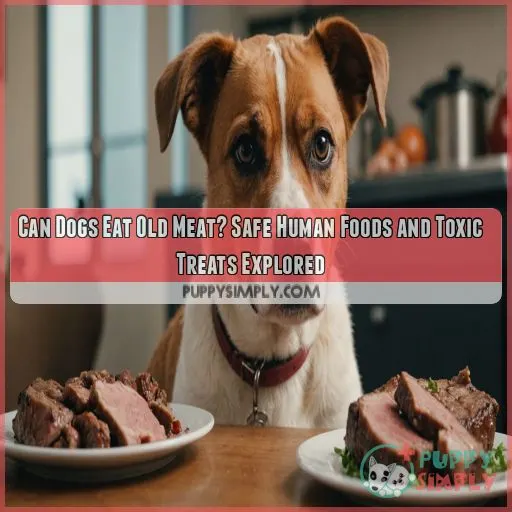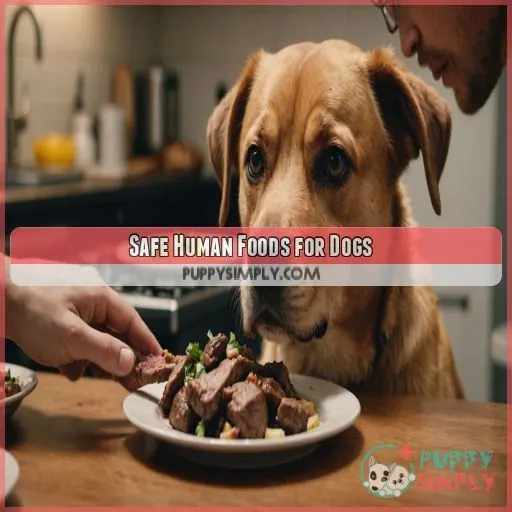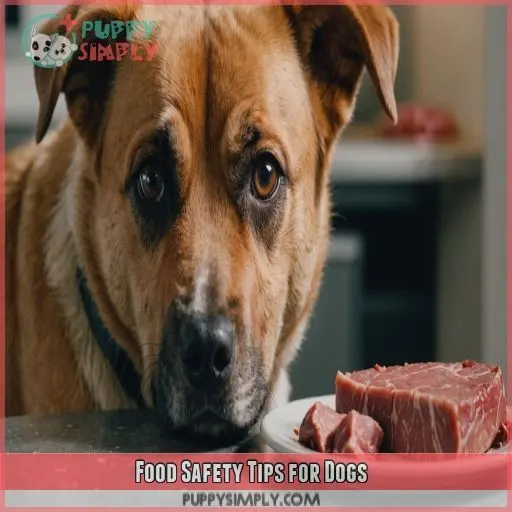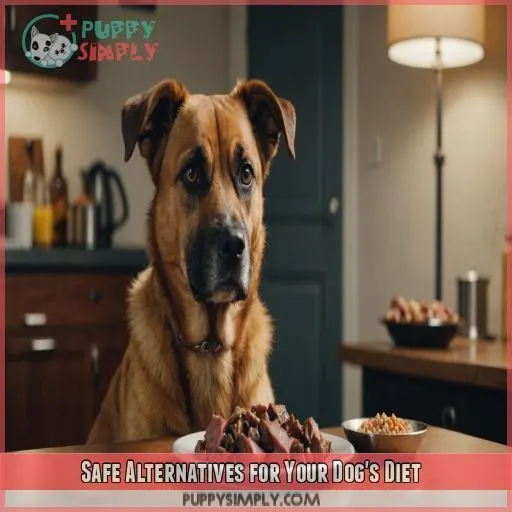This site is supported by our readers. We may earn a commission, at no cost to you, if you purchase through links.
 The eternal question: can dogs eat old meat?
The eternal question: can dogs eat old meat?
You’re wondering if it’s okay to feed your furry friend those leftovers that have been lingering in the fridge for a bit too long.
The short answer is nope! Old meat can harbor some nasty bacteria, like E. coli, that can cause food poisoning in dogs.
It’s just not worth the risk. You want to keep your pup safe and healthy, right?
So, it’s best to err on the side of caution and stick to fresh, safe food.
Want to know more about what human foods are safe for your dog?
Table Of Contents
- Key Takeaways
- Can Dogs Eat Spoiled Meat?
- Safe Human Foods for Dogs
- Foods to Avoid for Dogs
- Food Safety Tips for Dogs
- Safe Alternatives for Your Dog’s Diet
- Dog-Friendly Treats and Snacks
- Consulting With a Veterinarian
- Frequently Asked Questions (FAQs)
- Can a dog eat spoiled meat?
- Can dogs eat meat that is out of date?
- Can dogs eat expired food?
- Can dogs eat meat that was left out?
- Can dogs get food poisoning from spoiled meat consumption?
- How long does it take for dogs to show symptoms?
- What are the long-term effects of eating spoiled meat?
- Can dogs eat meat that has been frozen then thawed?
- Are certain dog breeds more susceptible to food poisoning?
- Conclusion
Key Takeaways
- You’re probably wondering if it’s okay to feed your furry friend those leftovers that have been lingering in the fridge for a bit too long – the answer is no! Old meat can harbor some nasty bacteria, like E. coli, that can cause food poisoning in dogs, and it’s just not worth the risk.
- When it comes to spoiled meat, it’s better to err on the side of caution – if you wouldn’t eat it, don’t feed it to your dog! Consuming spoiled meat can lead to vomiting, diarrhea, abdominal pain, and even life-threatening complications.
- To prevent your furry friend from eating spoiled meat, follow these precautions: store meat properly, check expiration dates, cook meat thoroughly, and avoid giving them old leftovers – your pup’s health is worth the extra effort!
- If you’re looking for safe alternatives to old meat, consider lean meats like chicken, turkey, or beef, boiled or baked without seasoning, and healthy snacks like apples, bananas, and green beans – your dog will thank you for the yummy, safe treats!
Can Dogs Eat Spoiled Meat?
You might be wondering if it’s safe to feed your furry friend that piece of meat that’s been sitting in the fridge for a few days. It’s important to know that spoiled meat can pose serious health risks to your dog, and it’s not worth taking the chance.
Risks of Consuming Spoiled Meat
When it comes to spoiled meat, it’s better to err on the side of caution. Consuming spoiled meat can be hazardous for your furry friend’s health.
Here are 4 reasons why:
- Bacterial contamination: Spoiled meat can harbor bacteria like E. coli, which can cause severe food poisoning in dogs.
- Mycotoxin dangers: Moldy meat can contain mycotoxins, toxic substances that can damage your dog’s liver and other organs.
- Pet health risks: Consuming spoiled meat can lead to vomiting, diarrhea, abdominal pain, and even life-threatening complications.
- Food poisoning symptoms: If your dog shows signs of food poisoning, seek Veterinary Care immediately to prevent long-term damage.
Understanding a Dog’s Digestive System
You want to know if Fido can handle spoiled meat. Let’s explore dog digestion and gut health to keep your furry friend safe and healthy.
| Dog Digestion | Human Digestion | Key Differences |
|---|---|---|
| More gastric acid | Less gastric acid | Stronger stomach acid in dogs |
| Faster raw meat metabolism | Slower raw meat metabolism | Dogs process raw meat quickly |
| More enzyme production | Less enzyme production | Dogs produce more digestive enzymes |
| Shorter digestive tract | Longer digestive tract | Dogs absorb nutrients faster |
Symptoms of Food Poisoning in Dogs
If your dog eats spoiled meat, monitor for symptoms like vomiting, diarrhea, dehydration, lethargy, and pain. These can be signs of food poisoning, and prompt veterinary care is really important.
- Watch for vomiting: A common symptom of food poisoning in dogs
- Diarrhea danger: Loose, bloody stools can lead to dehydration
- Lethargy alert: If your dog becomes lethargic or weak
- Pain warning: Whining, whimpering, or showing abdominal discomfort
Precautions to Prevent Dogs From Eating Spoiled Meat
To prevent your furry friend from eating spoiled meat, follow these precautions: store meat properly, check expiration dates, cook meat thoroughly, and avoid giving them old leftovers.
| Precaution | Action |
|---|---|
| Store meat safely | Keep raw or cooked meat in airtight containers or wrap it firmly before refrigerating. |
| Monitor expiration dates | Regularly check expiration dates on meat-based products to avoid serving spoiled meat. |
| Cook meat thoroughly | Cook meat thoroughly to kill bacteria and parasites, making it safer for your dog to eat. |
Safe Human Foods for Dogs
When you’re figuring out what your dog can eat, it’s important to know which human foods are safe. From pasta and rice to lean meats and veggies, we’ll explore the best treats to share with your dog, while also highlighting the toxic ones to avoid.
Pasta and Rice as Occasional Treats
You might be wondering if you can share your pasta and rice with your dog. They can be occasional treats, but be mindful of portion sizes and frequency to avoid overfeeding.
Here are some helpful guidelines:
- Pasta and rice frequency: Limit pasta and rice treats to once or twice a week, depending on your dog’s weight and activity level.
- Nutritional value: Cooked pasta and rice offer carbs, but not much protein, so balance them with protein-rich foods.
- Alternative treats: Try mixing cooked pasta or rice with healthy protein sources, like cooked chicken or green beans.
- Recipe ideas: Whip up a dog-friendly pasta salad with cooked pasta, mixed veggies, and a bit of low-sodium chicken broth.
Meat and Vegetable Options for Dogs
For a pup-friendly meal, opt for cooked chicken, turkey, or lean ground beef, paired with dog-friendly veggies like carrots, green beans, and zucchini for a nutrient-rich treat.
Bread and Pretzels in Moderation
For your canine companions, whole wheat bread in bite-sized pieces can be a nutritious snack, while unsalted pretzels are a safer alternative – but remember, moderation is key!
Sweet Treats for Dogs
- Most fruits: except grapes and raisins, are fair game.
- Homemade sweet potato jerky: a tasty and healthy alternative.
- Sugar-free peanut butter: a great base for treats.
- Dental chews: made with safe ingredients, support your dog’s oral health.
Foods to Avoid for Dogs
Regarding your furry friend’s diet, it’s vital to know what human foods are off-limits to avoid any potential harm. In this section, we’ll explore the foods to avoid for dogs, from raw or undercooked meat to fatty cuts, avocado, and other harmful snacks that can put your dog’s health at risk.
Raw or Undercooked Meat
When handling raw or undercooked meat, prioritize your dog’s safety. Bacterial contamination risks are real, so follow cooking temperature guidelines and meat storage tips to avoid raw meat dangers.
| Meat Handling Safety | Bacterial Contamination Risks | Cooking Temperature Guidelines |
|---|---|---|
| Handle raw meat safely | E. coli, Salmonella, Campylobacter | Cook to 165°F (74°C) |
| Store raw meat separately | Prevent cross-contamination | Use a food thermometer |
| Wash hands thoroughly | Avoid raw meat dangers | Cook ground meats to 160°F (71°C) |
| Prevent bacterial growth | Keep raw meat refrigerated | Cook poultry to 165°F (74°C) |
| Cook meat thoroughly | Avoid undercooked meat | Use safe cooking methods |
Fatty Cuts of Meat
Now that we’ve covered raw meat, let’s talk fatty cuts – think bacon and sausages. These can cause pancreatitis in dogs, so it’s best to avoid them altogether for your pup’s safety.
Avocado and Raw Dough
When it comes to your furry friend’s diet, there are two sneaky foods to avoid: avocados and raw dough. Here’s why:
- Avocado dangers: Avocados contain persin, a toxic compound that can cause vomiting and diarrhea in dogs.
- Raw dough risks: Raw dough can expand in your dog’s stomach, causing severe pain and potentially life-threatening complications.
- Stay safe: Always consult with your vet before introducing new foods or treats to your dog’s diet.
Salted Pretzels and Other Harmful Snacks
If you’re looking for snacks for your dog, be careful about salted pretzels, as they can lead to excessive thirst and potential health issues. Opt for unsalted alternatives instead.
Food Safety Tips for Dogs
Sharing your life with your furry friend means keeping their health and safety top of mind, especially when it comes to their food. By following a few simple food safety tips, you can make sure your dog enjoys a happy and healthy life, free from the risks of spoiled or toxic food.
Cutting Food Into Bite-Sized Pieces
When feeding your dog human food, remember to cut it into bite-sized pieces to avoid choking hazards and aid digestion. Here are some tips to keep in mind:
- Cut food into small, manageable chunks to prevent choking.
- Consider your dog’s teeth – if they’re old or sensitive, they may need smaller pieces.
- Use chew toys or interactive feeders to make mealtime more engaging and safe.
- Watch your dog while they eat to make sure they’re not gobbling their food too quickly.
Avoiding Moldy or Spoiled Food
When storing food, always check expiration dates and look for visible signs of spoilage. Keep your fridge organized, and prevent mold by using airtight containers to store leftovers.
Monitoring for Reactions
As you introduce new foods, monitor your dog for signs of trouble: digestive upset, skin reactions, or behavioral changes, which can indicate food allergies or individual tolerance issues.
Limiting Human Food Intake
To keep your furry friend safe, limit human food intake to 5-10% of their diet, ensuring a balanced mix of nutrients and avoiding overload – set those treat boundaries!
Safe Alternatives for Your Dog’s Diet
Regarding your dog’s diet, you want to make sure you’re giving them the best options. Instead of risking spoiled meat, consider lean meats like chicken, turkey, or beef boiled or baked without seasoning, and healthy snacks like apples, bananas, and green beans.
Lean Meats and Healthy Snacks
If you’re looking for safe alternatives to commercial dog food, lean meats and healthy snacks are a good way to go. Here are some options you can consider:
- Cooked chicken breast or thighs
- Boiled or baked turkey
- Steamed green beans
- Sliced apples
- Carrot sticks
Unsweetened Yogurt and Other Healthy Options
Now that we’ve covered lean meats and healthy snacks, let’s talk yogurt! Unsweetened yogurt is a great addition to your dog’s diet, providing probiotic power to support their digestive health. It’s a simple, healthy treat you can make at home.
Prioritizing Your Dog’s Health and Well-being
When it comes to your dog’s diet, think about their health and well-being by choosing nutrient-rich foods and consulting with your vet. This will help your furry friend stay happy, healthy, and safe from food-related harm.
Dog-Friendly Treats and Snacks
When you’re choosing treats and snacks for your dog, you want to make sure you’re giving them the best – and safest – options. From tasty Pet Pops to creative pill-hiding tricks, we’ll explore the fun and healthy ways to reward your dog without putting them at risk.
Pet Pops and Peanut Butter Pops
Now that you’ve got some healthy alternatives, let’s talk treats! Consider making pet pops and peanut butter pops at home. Here are some easy recipes:
- Frozen yogurt drops with shredded carrots and green beans
- Peanut butter and banana bites
- Pumpkin and sweet potato ice cubes
Homemade Sweet Potato Jerky
Now that you’ve tried Pet Pops and Peanut Butter Pops, let’s move on to Homemade Sweet Potato Jerky! Bake or dehydrate sliced sweet potatoes to create crispy, healthy treats. Just remember to store them safely to maintain freshness.
Pill Hiding and Holiday Treats
If you’re trying to hide pills in holiday treats, get creative! Use peanut butter, marshmallows, or ground beef to disguise pills. For Thanksgiving, offer dog-friendly desserts like sweet potato slices or green beans – safe and yummy!
Consulting With a Veterinarian
It’s super important to talk to your vet about what human foods are safe for your dog.
After all, your vet knows your furry friend’s unique needs and health quirks best.
Importance of Veterinary Advice
When it comes to your dog’s diet, a veterinarian is your best friend. Schedule regular check-ups to get personalized dietary guidance, address pet health concerns, and receive medication advice – they’re just a call away in case of an emergency.
Discussing Dietary Needs and Concerns
When discussing dietary needs and concerns with your vet, be honest about your dog’s eating habits, including any homemade recipes or dog food brands you’ve tried. Share any food allergies or sensitivities you’ve observed to create a personalized plan.
Getting Personalized Recommendations
Now that you’ve discussed dietary needs and concerns with your vet, it’s time to get personalized recommendations. Your vet will consider factors like breed, food allergies, and lifestyle to create a custom plan, including vet-approved treats and snacks.
Frequently Asked Questions (FAQs)
Can a dog eat spoiled meat?
Don’t risk it! While dogs have tougher stomachs, spoiled meat can still harm them. If you wouldn’t eat it, don’t feed it to your furry friend. Stick to fresh, safe food to keep them healthy and happy.
Can dogs eat meat that is out of date?
If you’re wondering if dogs can eat out-of-date meat, it’s best to err on the side of caution. Even if your dog has a stronger stomach than you, expired meat can still harbor bacteria like Salmonella and E. coli .
Can dogs eat expired food?
Don’t risk it! While dogs have robust stomachs, expired food can still harbor bacteria like Salmonella and E. coli, causing vomiting, diarrhea, and dehydration. Prioritize your pup’s safety and stick to fresh, healthy options." (Source)
Can dogs eat meat that was left out?
Regarding meat left out, it’s better to err on the side of caution. If you wouldn’t eat it, don’t feed it to your dog – bacteria like Salmonella and E. coli can multiply rapidly.
Can dogs get food poisoning from spoiled meat consumption?
If your dog eats spoiled meat, they can get food poisoning, which can be life-threatening (Source). Watch for symptoms like vomiting, diarrhea, and lethargy , and seek veterinary care immediately if you suspect food poisoning (Source).
How long does it take for dogs to show symptoms?
If your dog has eaten spoiled meat, symptoms can appear anywhere from a few hours to a few days later. Keep a close eye on your furry friend and seek vet care ASAP if you notice vomiting, diarrhea, or lethargy.
What are the long-term effects of eating spoiled meat?
If your dog eats spoiled meat, long-term effects can be severe, including liver damage, organ failure, and even death. Keep a close eye on your pup and rush to the vet if you notice any suspicious symptoms.
Can dogs eat meat that has been frozen then thawed?
Imagine you’re a master chef for your furry friend! When you’re thinking about using frozen-then-thawed meat, use caution. If thawed safely and stored properly, it’s likely safe for your dog to eat, but always prioritize freshness to avoid bacterial growth.
Are certain dog breeds more susceptible to food poisoning?
When it comes to food poisoning, some dog breeds may be more sensitive to certain foods or toxins. However, any dog can get food poisoning, so it’s really important to be cautious and monitor their diet closely .
Conclusion
Every year, over 200,000 cases of food poisoning in dogs are reported in the US alone.
You don’t want your furry friend to become a statistic, right?
So, remember: when in doubt, throw it out!
Don’t risk feeding your dog old meat, as it can harbor nasty bacteria.
Stick to fresh, safe food and treats specifically formulated for dogs.
Your pup’s health is worth it.
Always prioritize caution when wondering if dogs can eat old meat.













